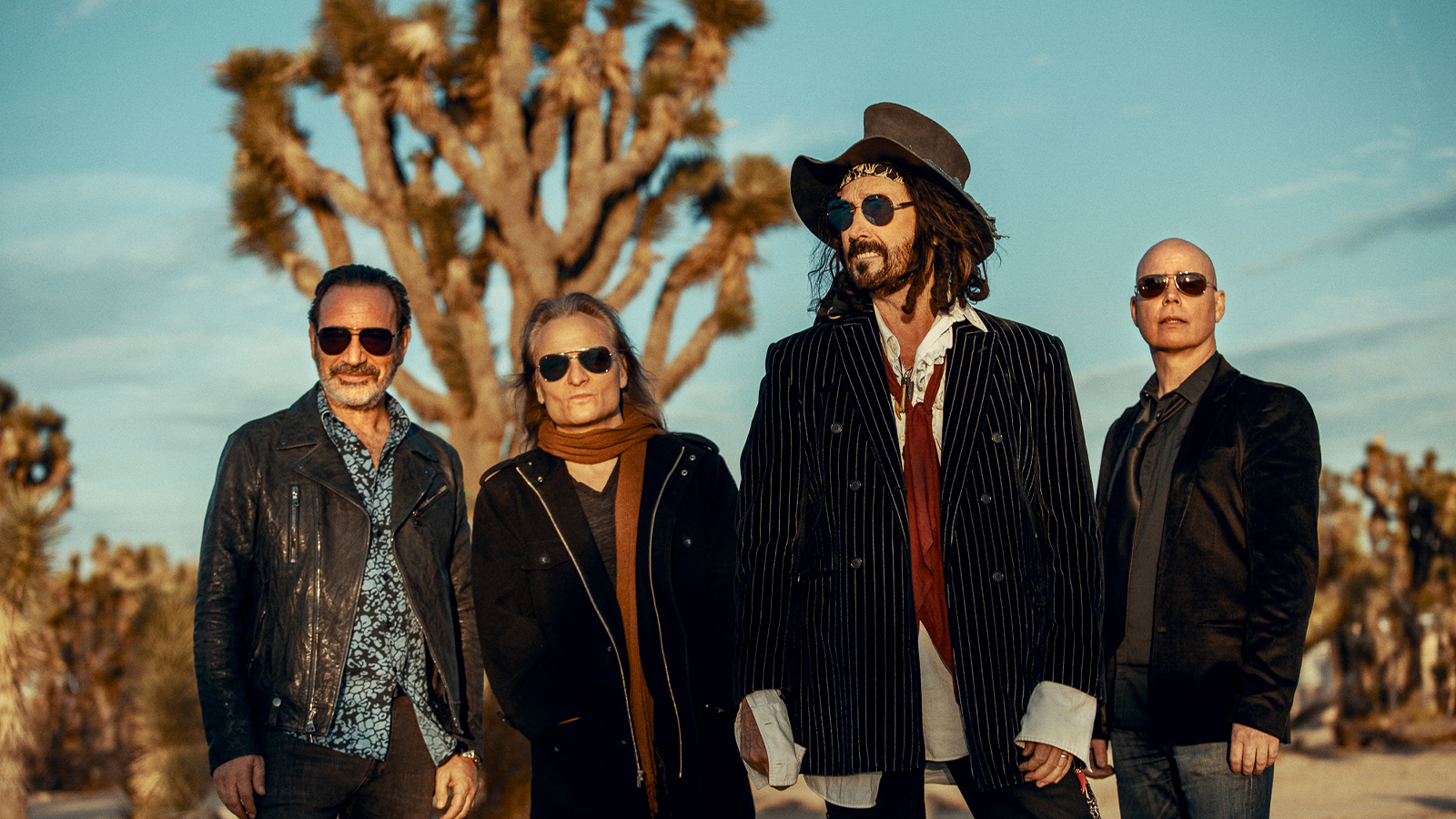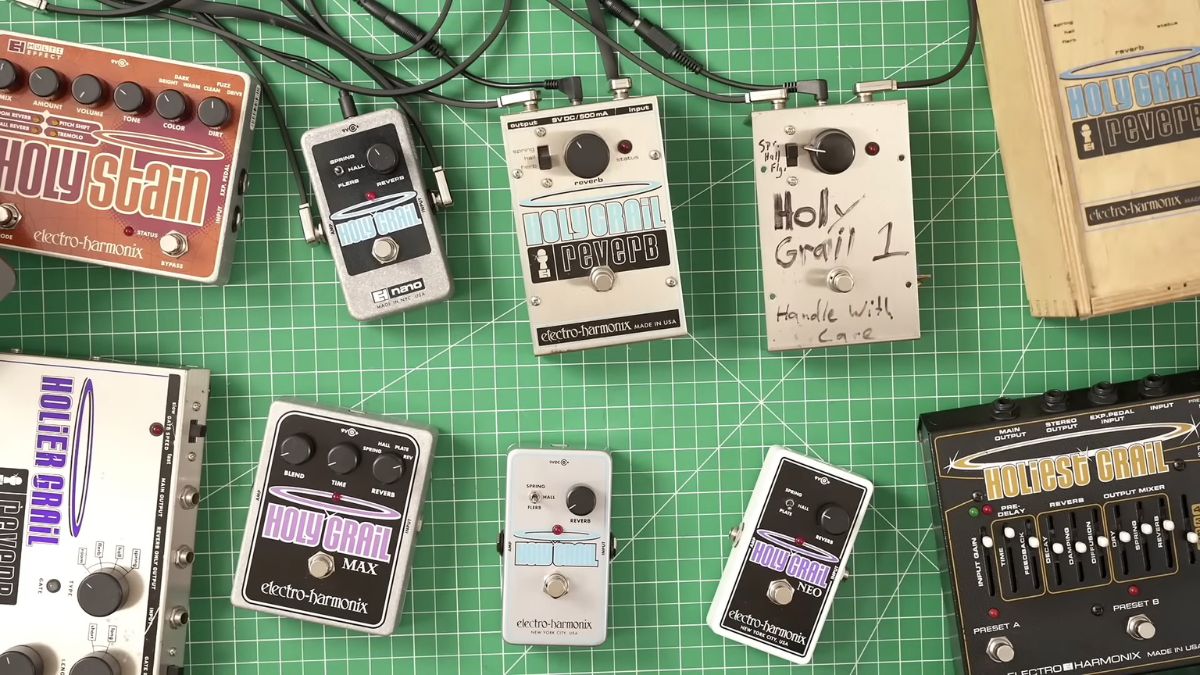Mike Campbell: “We’re always trying to kick it up, write better songs, play better…”
Mike Campbell’s second album with The Dirty Knobs, External Combustion, shows him rockin’ ’n’ rollin’ like never before. Here’s how he brought it to life.

Over some 50 storied years of shredding, Mike Campbell has played on over 50 albums for over 30 artists – he’s jammed with everyone from Paula Abdul to Roy Orbison, and cut his teeth as an integral member of Stevie Nicks’ brass. The ‘80s saw him working closely with Bob Dylan (and he rejoined the fold for 2009’s Together Through Life), and in the latter half of the 2000s, he was Neil Diamond’s go-to guy. But if there’s one thing most people know Campbell for, it’s his longstanding role in The Heartbreakers, strumming side-by-side with Tom Petty from 1976 all the way up until Petty’s death in 2017.
During the last decade or so of his Heartbreakers tenure, Campbell led a rock ’n’ rolling side-project called The Dirty Knobs. It started off as a bit of fun – a way for Campbell to flex his muscles in a different setting every now and then – but after Petty’s untimely passing, he pivoted the project into his full-time gig. The band’s 2020 debut, Wreckless Abandon, was an intentional easing-in for longtime fans, to show off his new palette without scaring away any skeptics. But for his second full-length effort with The Dirty Knobs – the very aptly titled External Combustion – he’s gone full steam ahead with the stomping, skanking, swampy and soulful jammage.
Australian Guitar got Campbell on the phone to riff (no pun intended) on the way this game-changing record made it from his mind to the Marshalls.
I want to start by going back to Wreckless Abandon, because in a lot of ways, that was like a formal introduction to this project – despite the fact it’d already been around for a solid 15 years by then. Having finally made that album, did it feel like this project had grown into something new? Or have you managed to maintain that loose and experimental chemistry?
We have managed to maintain our loose and experimental chemistry. We’ve been together a long time, too, so there’s nothing that was just thrown together – The Dirty Knobs have been playing between Heartbreakers tours for the last 15 years or more, so we’re very comfortable with each other. And I’m very comfortable stepping into a leading role this band. I loved supporting Tom in the Heartbreakers, where I had somewhat of a co-captain role, but now I’m the captain in this band, and it feels right. Of course, I’m sad – I’m still grieving for my friend – but I must carry on. And if I must carry on, I would rather carry on with these guys, because we love each other and we make some good sounds together.
I can only imagine how many songs you would’ve accumulated for Wreckless Abandon, having 15 storied years worth of material backlogged. Did it almost feel like a weight off your chest to get all of those songs out there?
Well, I haven’t it gotten all of it out yet! There’s still shelves of old demos there, waiting to be sifted through… It’s kind of overwhelming, to be honest. I just write so much – and y’know, some of it’s crap, but there’s some real gems in there. I’m in the process of going through all of the old analog tapes. Three or four of the songs songs on [External Combustion] were found that way – I had completely forgotten about them, but I pulled them out and I thought, “Y’know, this would fit on the new album!” But it’s just a little overwhelming to keep up with all the writing, because I’m just obsessed.
So going into album #2, how did you want to kick The Dirty Knobs up to the next level?
We’re always trying to kick it up, write better songs, play better… Improve – that’s the word I’m looking for. You always want to improve. The first album kind of set up that we’re a boogie/rock ’n’ roll band with ‘60s influences – that’s where we’re coming from, and that’s what I’m inspired by. But for the second record, I didn’t put much thought into that. I thought, “Let’s keep doing what we’re doing, and hope that we come up with some good songs.” And I think we did! I think some of the songwriting on the new album is a little deeper and a little more explorative than it was on the first album. I think that’s an improvement. But essentially, we’re just trying to keep the bones of it being a four-piece band having fun when we play – because that’s what we do.
How important is the creative dynamic you have with the rest of the band?
Oh, it’s very important. I mean, I could have made this record as a solo record, brought in some studio cats and taught them the songs. It probably would’ve sounded pretty good, too. But I wanted it to sound like a band. I wanted to have all the blemishes and imperfections that are just right for what I’m going for. I didn’t want to polish anything. We did very few overdubs – almost all the guitar solos were live on the floor, conjured up there during the take. That’s what we were going for, so it’s very important that this band is telepathic with me, and they follow me really well. And if I go in a certain direction, they do follow me really well.
All the latest guitar news, interviews, lessons, reviews, deals and more, direct to your inbox!
Did you do this entire album live-to-tape?
Live yes, but we didn’t use tape. We do everything digitally nowadays. Although, a couple of those old demos that I did on analog tape, they were really good, so I just took those tapes and overdubbed the Knobs onto those. But we recorded most of it live to digital. There very few overdubs with those recordings, because we just tried to get everything into the take while we were playing it.
Does it feel more “authentically rock ’n’ roll” to record live?
I like both methods, y’know? I really do. But I prefer human contact and interaction – it makes it a little more fun. Recording alone can be fun sometimes – it’s never a struggle to get the muse going – but I prefer to have the guys around me, interacting with me and hopefully bringing out something better in me, which I wouldn’t get if I was just sitting there by yourself.
What kind of guitars were you tearing it up on for External Combustion?
I ended up using one guitar most of the time, because we were always in a hurry to play the next song and I didn’t want to be wasting too much time changing guitars around. And I love this Les Paul I have, this ’59 Les Paul, so we got our sound up on it and I just kept in clutch. It’s a very versatile guitar, y’know, I can make it do a lot of things without swapping to another guitar. So probably around 95 percent of the of the record is that Les Paul. ‘Electric Gypsy’ is a Telecaster, because I wanted something that would do a string-bending thing. But that’s the only guitar I remember changing over to.
So why is there a Firebird on the cover?
Well, because that’s what I’ve been using live. I picked that up on the road, during the Fleetwood Mac tour, for $500. And I love it. It never made it to the studio for some reason, but when we started rehearsing, it definitely became the favourite. I’m never going to take the ’59 Les Paul on tour because it’s too valuable. So I pull out the Firebird, and it works really good for the live show.

Ellie Robinson is an Australian writer, editor and dog enthusiast with a keen ear for pop-rock and a keen tongue for actual Pop Rocks. Her bylines include music rag staples like NME, BLUNT, Mixdown and, of course, Australian Guitar (where she also serves as Editor-at-Large), but also less expected fare like TV Soap and Snowboarding Australia. Her go-to guitar is a Fender Player Tele, which, controversially, she only picked up after she'd joined the team at Australian Guitar. Before then, Ellie was a keyboardist – thankfully, the AG crew helped her see the light…
- Ellie RobinsonEditor-at-Large, Australian Guitar Magazine
